Tea is a staple beverage enjoyed worldwide, with many of us familiar with varieties like green, black, and white tea.
But have you ever tried tulsi tea? Also known as holy basil tea, this herbal infusion is gaining global recognition for its unique flavor and powerful medicinal properties. Backed by numerous studies, tulsi is celebrated for its therapeutic effects, making it more than just a soothing drink.
Curious about its benefits? Read further to learn about the remarkable health perks and amazing facts about this ancient healing herb.
What Is Tulsi Tea?
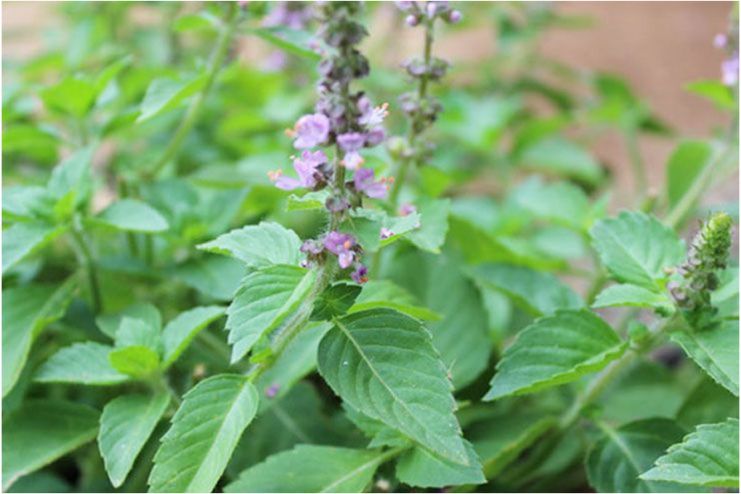
Tulsi tea is a botanical infusion prepared with the leaves of the tulsi plant (Ocimum tenuiflorum or Ocimum sanctum), also known as holy basil.
Indigenous to the Indian subcontinent, tulsi is also deeply rooted in religious and cultural traditions, primarily in Hindu philosophy, where tulsi is viewed as the earthy form of the goddess Lakshmi, the goddess of wealth. The word “tulsi” means “the incomparable plant.”
A member of the Lamiaceae family, tulsi is a perennial herb that flourishes throughout Southeast Asia. There are several varieties of the plant, such as Krishna tulsi, Rama tulsi, and Vana tulsi, each with distinctive characteristics. Due to its medicinal properties, tulsi has been an integral part of Ayurvedic medicine for centuries. It is also used as a prominent spice in Thai cooking and is widely cultivated in gardens as an organic insect repellent.
Aside from its medicinal and cultural importance, tulsi leaves are utilized to make tulsi tea, a calming and health-promoting beverage that is increasingly popular globally.
Moreover, tulsi tea is a popular herbal infusion because it is free from caffeine and full of nutritional benefits.
Nutritional Facts And Properties Of Tulsi Tea
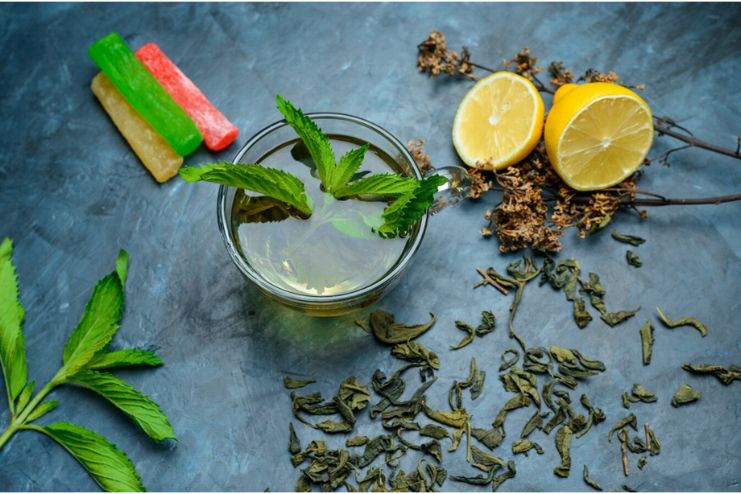
Fresh holy basil (tulsi) has essential vitamins and minerals such as vitamin C, calcium, magnesium, potassium, and iron. It also has antioxidants like lutein, zeaxanthin, beta-carotene, and beta-cryptoxanthin.
- Polyphenolic Flavonoids: Basil leaves contain polyphenolic flavonoids such as orientin and vicenin, which exhibit antioxidant properties.
- Essential Oils: The essential oils in basil, including linalool, limonene, eugenol, citronellol, citral, and terpineol, are known for their antibacterial and anti-inflammatory activities.
- Nutrient Profile: Basil is a low-calorie herb with no cholesterol, rich in essential nutrients, minerals, and vitamins. It provides vitamins like beta-carotene, cryptoxanthin, vitamin A, lutein, and zeaxanthin.
- Zeaxanthin: Zeaxanthin, a yellow flavonoid carotenoid in basil, is selectively absorbed into the retinal macula lutea, where it helps filter harmful UV rays from reaching the retina.
- Vitamin K: Basil is an excellent source of vitamin K, which aids in producing clotting factors in the blood and contributes to bone mineralization and strengthening.
- Mineral Content: The leaves contain significant amounts of minerals like manganese, potassium, copper, and magnesium, which help control blood pressure and heart rate.
- Iron: Basil leaves are a good source of iron, enhancing the oxygen-carrying capacity of the blood.
Read More: Iron-Rich Leafy Green Salad: Combat Anemia Deliciously
Benefits Of Tulsi Tea:

Holy basil’s powerful health benefits stem primarily from its active compound, eugenol, which is known for its therapeutic properties. Ursolic acid and carvacrol further enhance its antimicrobial effects.
Rich in antioxidants, tulsi helps protect the body from free radicals, which can contribute to chronic degenerative diseases.
The essential oils of the holy basil leaves, like eugenol, citronellol, citral, limonene, linalool, and terpineol, have powerful anti-inflammatory and antibacterial activity. Eugenol, in particular, suppresses enzymes to rectify inflammatory diseases like osteoarthritis, rheumatoid arthritis, and inflammatory bowel disease. Basil oil also has anti-infective activity, effectively inhibiting pathogenic bacteria like Staphylococcus, Shigella, and Enterococci.
Basil tea or infused basil water also cures nausea, along with mild antiseptic activity.
12 Incredible Health Benefits of Tulsi Tea
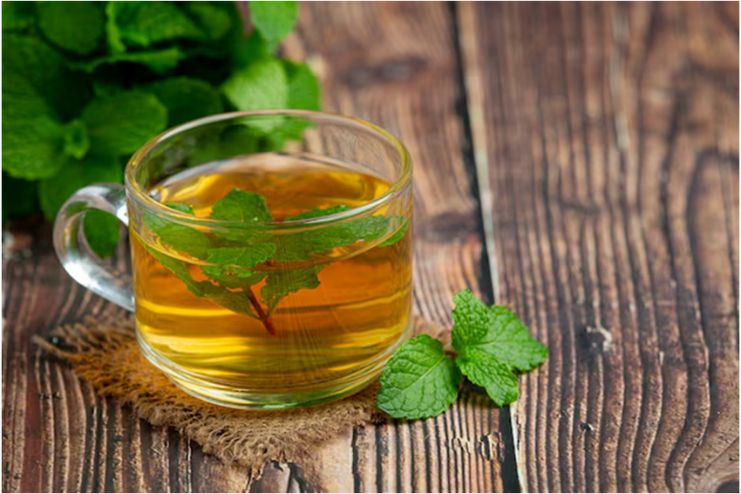
Holy basil’s offers cardiovascular benefits, weight reduction, benefits from respiratory diseases, diabetes, cancer, arthritis, digestive system benefits, etc.
1. Improve Respiratory Illness:
Tulsi is an excellent cure for respiratory illnesses – as simple as cold and as severe as asthma and bronchitis. It comes with expectorant, immunomodulatory, and antitussive properties. Its antibacterial and anti-inflammatory properties help fight infection-causing agents of respiratory illness.
2. Proven To Relieve Fever:
The antimicrobial properties of tulsi leaves help treat mild fever and offer speedy recovery from any illness. They also work great as an antipyretic agent and cool down the body temperature. Do not hesitate to pick a cup of tulsi tea for any fever-like condition.
3. Relieves Stress and Fights Heart Diseases:
The magnesium in Tulsi extract is vital in fighting heart disease. The holy basil leaves are cholesterol-free and hence good at keeping cholesterol levels and blood pressure under control.
Read More: Adaptogens for Stress: Natural Remedies to Calm Your Mind and Body.
4. Promotes Oral And Dental Health:
Tulsi has been used as a wonder herb for dental and oral care for ages. The antibacterial properties of the herb help fight oral germs besides regulating blood flow in the body. It acts as a natural mouthwash and can fight oral diseases like mouth ulcers, gum bleeding, etc.
5. Fights Kidney Stones And Digestive Disorders:
Herbs such as holy basil soothe the stomach and improve digestion while also aiding with liver health. As Tulsi works as a detoxifier and diuretic, it helps maintain kidney health. The essential oils in tulsi leaves help break down kidney stones and improve kidney functioning.
Read More: 23 Pain-Free Natural Remedies to Flush Out Kidney Stones.
6. Helps Reduce Weight:
If you are looking for supplements or weight-loss products that help shed extra calories, a cup of tulsi tea would help. Several studies revealed the efficiency of tulsi in offering effective and safe weight-loss results. The holy basil tea works by burning extra calories and increasing the body’s metabolism.
7. Improves Skin And Hair Health:

Tulsi extract works excellently for skin and hair health because of its nutrients, polyphenols, and antioxidant properties. Its nutrients also reduce itchiness in the scalp and reduce unusual hair fall.
8. Helps Fight Diabetes:
Daily intake of tulsi is known to reduce blood sugar levels to optimum levels. It works well in metabolizing carbohydrates and fats, keeping the risk of diabetes at bay.
9. Fights Cancer:
Several studies reveal that tulsi may offer protection against several cancer types due to its strong anti-carcinogenic and antioxidant properties. It acts by neutralizing several dangerous chemicals that promote carcinogen cell formation.
Read More: How to Identify Cancerous Moles: Signs You Shouldn’t Ignore
10. Helps Quit Smoking:
Surprisingly, a cup of tulsi tea every day can help you stay away from psychological and physical dependence on smoking. Ayurveda heavily relies on using tulsi tea to cease smoking.
11. Treats Arthritis:
Chronic illnesses like arthritis can also be cured using tulsi leaf extracts and tulsi tea. The antioxidant and anti-inflammatory properties of tulsi effectively fight free radicals responsible for the degeneration of joint tissues.
Read More: 7 Best Remedies For Arthritis And Treatment At Home
How To Select And Store Holy Basil Leaves?
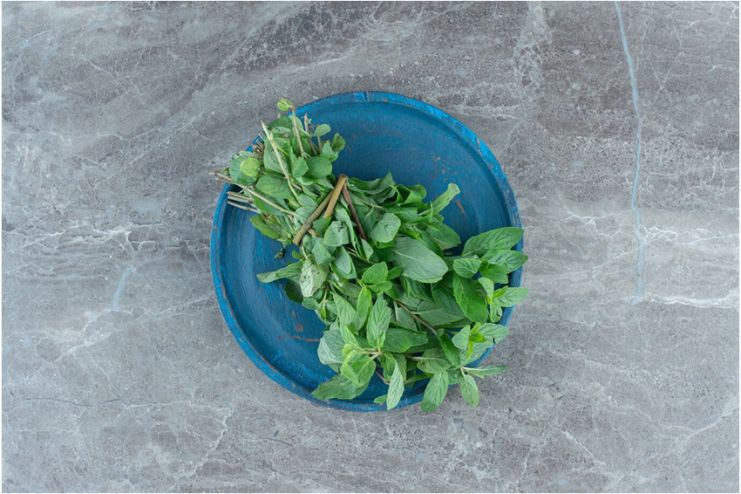
Choose fresh organic holy basil over dry basil for tea preparation. Fresh tulsi leaves are rich in essential oils and offer superior flavor. Follow these instructions when selecting and storing tulsi:
- Select basil leaves that do not have dark, yellow spots.
- Pick high-quality dry basil seeds and leaves.
- Sun-dried or radiation-subjected basil leaves have lower concentrations of essential oils, carotene levels, and Vitamin C.
- Fresh sweet basil leaves should be stored in the refrigerator in proper humid conditions.
- Store dried basil in a sealed container, in a cool, dry, dark place.
How To Make Tulsi Tea?
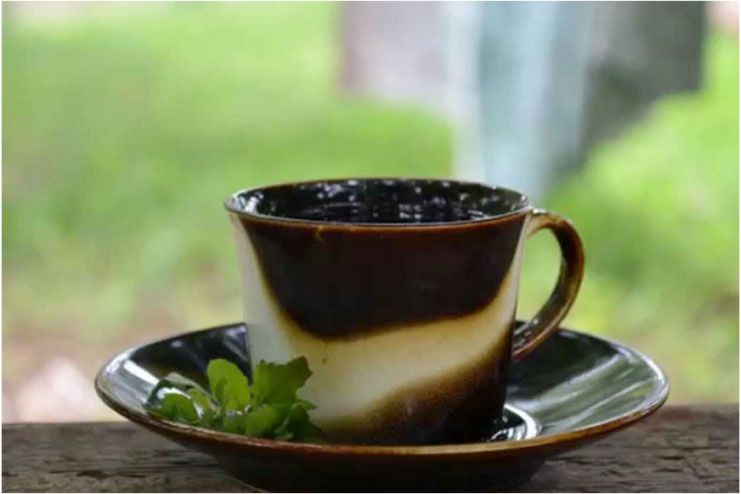
Like any other tea, dried or fresh tulsi leaves are steeped in hot water to make a tulsi tea beverage. Follow these simple tips while preparing tulsi tea:
- Wash fresh basil leaves under running water, to remove the dirt or pesticide residues.
- Add the basil leaves after the water is thoroughly boiled to retain the flavor.
- Avoid prolonged steeping to retain the benefits.
- Serve hot in your favorite cup.
Precautions and Side Effects Before Consuming Tulsi Tea:
Even though not enough evidence to support this, a few side effects are associated with basil tea. Some of them include:
- Avoid tulsi leaf tea during breastfeeding and pregnancy as not enough research says basil is safe during these phases. To be on the safer side it is better to avoid if you are pregnant or a nursing mother.
- Holy basil is believed to slow down blood clotting. Hence, it is better to avoid holy basil tea after surgery. Stop tulsi tea consumption at least 2 weeks before a scheduled surgery.
- Excess tulsi consumption causes eugenol overdose, which may lead to poisoning.
- People who are on diabetic medications should not consume excess tulsi tea as it would lead to reduced blood sugar levels, causing a condition called hypoglycemia.
- Excessive tulsi tea consumption leads to a decrease in sperm count, thereby affecting fertility.
Final Thoughts:
In conclusion, tulsi tea offers excellent health and medicinal benefits. A sip of tulsi tea every day not only helps with physical well-being but also aids mental well-being.
Include this herbal beverage in your daily range of fluids to reduce emotional stress as well as prevent infectious diseases. However, remember to consume it in moderation.
Here’s your chance to go grab your cup of tulsi tea and enjoy amazing benefits!
FAQs:
1. When should I drink tulsi tea?
Tulsi tea can be consumed anytime throughout the day from morning to night, but has to be taken in moderate amounts. The strength and quantity of the organic holy basil tea help with quick recovery.
2. How many cups of tulsi tea is safe to consume per day?
A maximum of 2-3 cups of tulsi tea per day offers the complete health benefits of holy basil leaves. However, just a cup every day also works well too. Ensure that your tulsi consumption is in moderate amounts to avoid possible side effects.
3. Does tulsi tea contain caffeine?
Tulsi or holy basil tea is caffeine-free. However, if it is consumed in fusion with other tea varieties, such as black or green tea, it can be termed a caffeinated drink.
4. Where can I buy tulsi tea and how should I store it?
Buy a Holy Basil plant from your local nursery or grow from seed to have fresh tulsi leaves for your tea. You can also buy organic tulsi or holy basil tea from online retailers or local natural food stores in dried form. Store as per the directions to retain freshness for at least two years. Dried leaves can retain freshness when stored in a cool, dark place away from light and moisture.
5. What does tulsi tea taste like?
Tulsi tea comes with a strong astringent aroma. It may have a bitter flavor, spicy, floral, and peppery notes. It may also have a sweet flavor based on the variety of tulsi leaves used in the tea.
-
Feb 2018Written by Sumana Maheswari
-
Apr 2025Edited by Vaishnavi
References
- https://pmc.ncbi.nlm.nih.gov/articles/PMC4868837/
- https://www.sciencedirect.com/topics/agricultural-and-biological-sciences/ocimum-tenuiflorum
- https://pmc.ncbi.nlm.nih.gov/articles/PMC3059441/
- https://www.msdmanuals.com/home/special-subjects/dietary-supplements-and-vitamins/holy-basil
- https://pmc.ncbi.nlm.nih.gov/articles/PMC4296439/
- https://pmc.ncbi.nlm.nih.gov/articles/PMC5376420/
- https://www.sciencedirect.com/topics/agricultural-and-biological-sciences/ocimum-tenuiflorum
- https://www.gijhsr.com/GIJHSR_Vol.3_Issue.4_Oct2018/7.pdf
- https://pmc.ncbi.nlm.nih.gov/articles/PMC4889806/
- https://www.medicalnewstoday.com/articles/266425
- https://globalrph.com/2024/05/anemia-treatment-cooking-with-sweet-basil
In this Article


















